|
|
|
Sort Order |
|
|
|
Items / Page
|
|
|
|
|
|
|
| Srl | Item |
| 1 |
ID:
107089
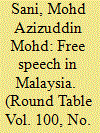

|
|
|
|
|
| Publication |
2011.
|
| Summary/Abstract |
This article attempts to explore the introduction and progress of the idea and concept of free speech in Malaysia. It demonstrates that the idea of freedom and liberty has existed since the feudal period of the Malay Sultanate. However, the idea was very limited owing to constraints imposed by the feudal kings. The people saw the kings as divine figures. When the British colonised the Malay states, they introduced the modern Western concept of free speech. This was later embedded in the Malayan/Malaysian Constitution during the country's independence in 1957 as one of the essential fundamental liberties of the people. However, the British were also responsible for introducing several repressive laws, such as the Printing Presses and Publications Ordinance. The Malaysian government continued this policy after independence to the detriment of the practice of free speech in the country.
|
|
|
|
|
|
|
|
|
|
|
|
|
|
|
|
| 2 |
ID:
151142
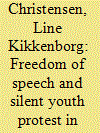

|
|
|
|
|
| Summary/Abstract |
T This article suggests that a political censorship regime
exists in Bhutan and that appeals to ensure security and sovereignty
of the country, rather than power, are used to uphold this regime.
Fieldwork uncovers that fear of how authorities may punish
anyone in open opposition is widespread among Bhutanese college
students. A number of political issues are characterised as ‘sensitive’
by informants and skilful navigation around them is needed. The
perception of free speech as limited inspires self-censorship in public
and in private among Bhutanese college students. Free speech is
practised in culturally specific ways and online, where anonymous
opposition against the established correct ‘non-discourse’ is known
as ‘silent protests’.
|
|
|
|
|
|
|
|
|
|
|
|
|
|
|
|
| 3 |
ID:
164022
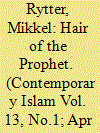

|
|
|
|
|
| Summary/Abstract |
This paper explore the politics of (in)visibility in Islam by discussing the affective presence and agency of relics - in this case a single hair of the Prophet Muhammad. The relic is obviously not the Prophet, but it is also not-not the Prophet, as the hair is filled with the baraka (blessings) of the Prophet and thereby seems to confirm Sir James Frazer’s thesis of ‘sympathetic magic’ where part and wholes are forever connected. Based on a study of the Naqshbandi Mujaddidi Saifi tariqa, this paper set out to ‘follow the hair’ in different settings in Denmark, Norway and Pakistan in order to discuss how it connects the visible and the invisible aspects of reality. I argue that the relic not only constitutes an affective presence of the beloved, but also that it becomes a significant agent in the establishment of an enchanted subaltern counter-public within Danish secular society.
|
|
|
|
|
|
|
|
|
|
|
|
|
|
|
|
| 4 |
ID:
154399
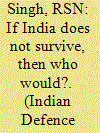

|
|
|
| 5 |
ID:
165295
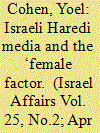

|
|
|
|
|
| Summary/Abstract |
In 2018 the Jerusalem District Court fined the Haredi Kol Barama radio station 1 million shekels ($280,000) for excluding women from the airwaves, stirring outrage within the Haredi community, highly sensitive to appearances of women in public contexts, which had created the station to provide radio broadcasts for its constituents, whose needs were not met by mainstream radio stations. The affair thus serves as a cardinal test of the level of freedom of a radio station, the interests of minority religious audiences, and the powers and responsibilities of the supervising public broadcasting authority.
|
|
|
|
|
|
|
|
|
|
|
|
|
|
|
|
| 6 |
ID:
118675
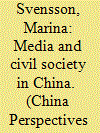

|
|
|
|
|
| Publication |
2012.
|
| Summary/Abstract |
Although Chinese journalists are not able to create their own independent organisations, they are engaging in informal networking on-line and off-line that has created a strong sense of community among investigative journalists in particular. Through sharing experiences, stories, and struggles, journalists create a collective identity and define their roles in society. Earlier studies of Chinese journalists haven't explicitly addressed the issue of how a journalistic community is created and sustained in a society that lacks freedom of the press and where freedom of association is severely restricted, and the importance of new information and communication technologies (ICTs) in this context, which is the focus of this article. Furthermore, it is important to study the extent to which and how investigative journalists network with other groups in society, including lawyers, public intellectuals, and civil society organisations. With the development of micro-blogging (weibo) we see new forms of community building, more open expressions of solidarity and ironic resistance, as well as increasing levels of interactivity between different groups in society. By reporting on injustices and the situation of marginalized groups in society, and commenting on public events on weibo, investigative journalists interact with many different groups in society and become part of a larger community of people who share the same ideals and struggles. Some journalists go one step further and set up or become actively involved in charity work and civil society organisations.
|
|
|
|
|
|
|
|
|
|
|
|
|
|
|
|
| 7 |
ID:
169031
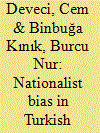

|
|
|
|
|
| Summary/Abstract |
This article analyzes the approach in Turkey on hate speech by evaluating legal regulations, decisions and public responses. We argue that the Turkish case cultivates neither a lenient, nor a restrictive response to hate speech, because a strong nationalist bias seems to be at work in interpreting, penalizing or allowing hate speech. The peculiarity of the Turkish case stems from a prejudice that hate speech might be conducted only against the nation, unity of the state, or the principles of regime, rather than against vulnerable groups or identities. By focusing on the Hrant Dink case among others we try to demonstrate the most striking example of this prejudice.
|
|
|
|
|
|
|
|
|
|
|
|
|
|
|
|
| 8 |
ID:
179972
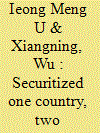

|
|
|
|
|
| Summary/Abstract |
This paper examines how Macau, with a different political and legal system under the “one country, two systems” principle, fits into China’s securitization and what impact that has on its local governance. We argue that in recent years Macau’s legal system has gradually transformed into a means of social control. Through case files related to the Assembly and Demonstration Law drawn from the Court of Final Appeal, we demonstrate that although Macau is unlike Hong Kong, where dissidents are subject to severe repression, Beijing’s emphasis on national security has weakened the checks-and-balances function of Macau’s legal system and substantially narrowed the scope of freedom of speech, even though it is nominally guaranteed and protected by the Basic Law.
|
|
|
|
|
|
|
|
|
|
|
|
|
|
|
|
| 9 |
ID:
190501
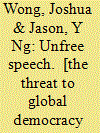

|
|
|
|
|
| Publication |
London, W H Allen, 2020.
|
| Description |
xx, 268p.pbk
|
| Standard Number |
9780753554791
|
|
|
|
|
|
|
|
|
|
|
|
Copies: C:1/I:1,R:0,Q:0
Circulation
| Accession# | Call# | Current Location | Status | Policy | Location | IssuedTo | DueOn |
| 060369 | 321.8/WON 060369 | Main | Issued | General | | RF020 | 29-Nov-2023 |
|
|
|
|
|
|
|
|
|